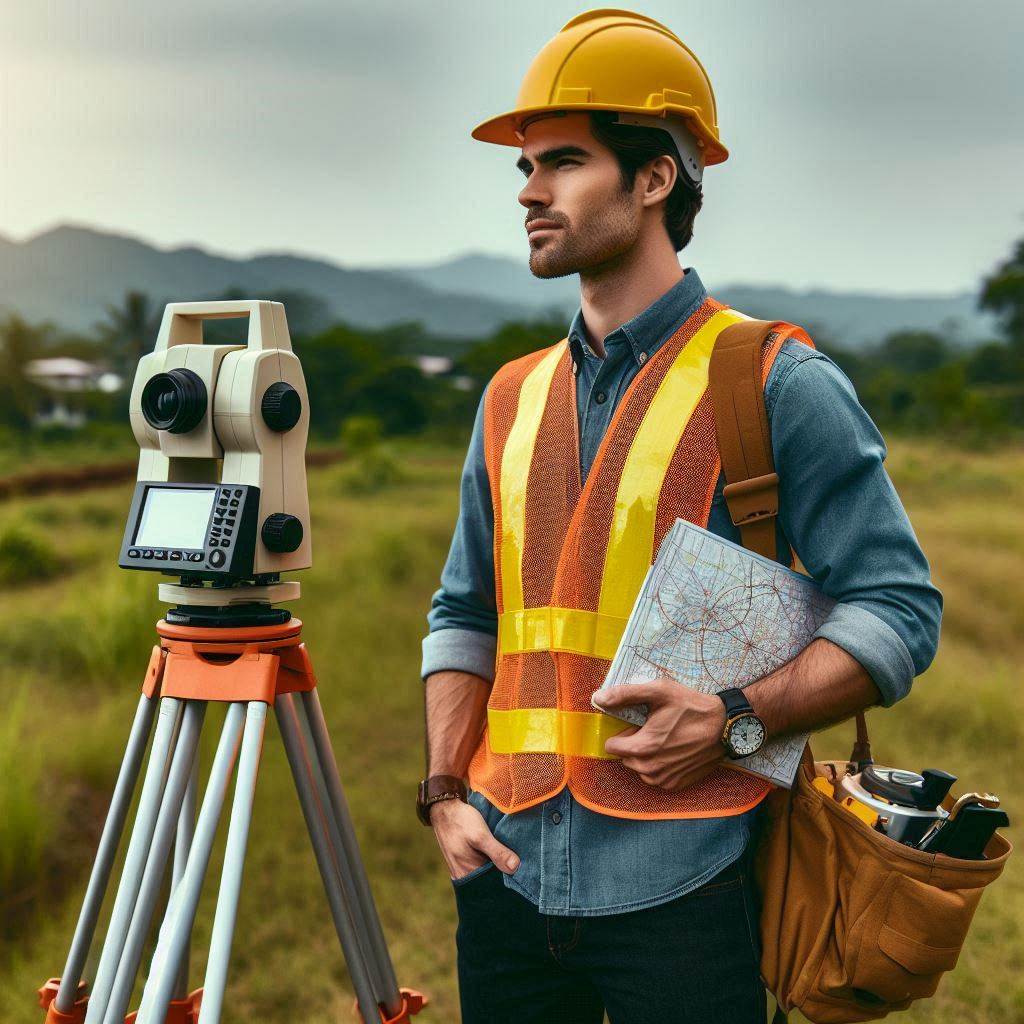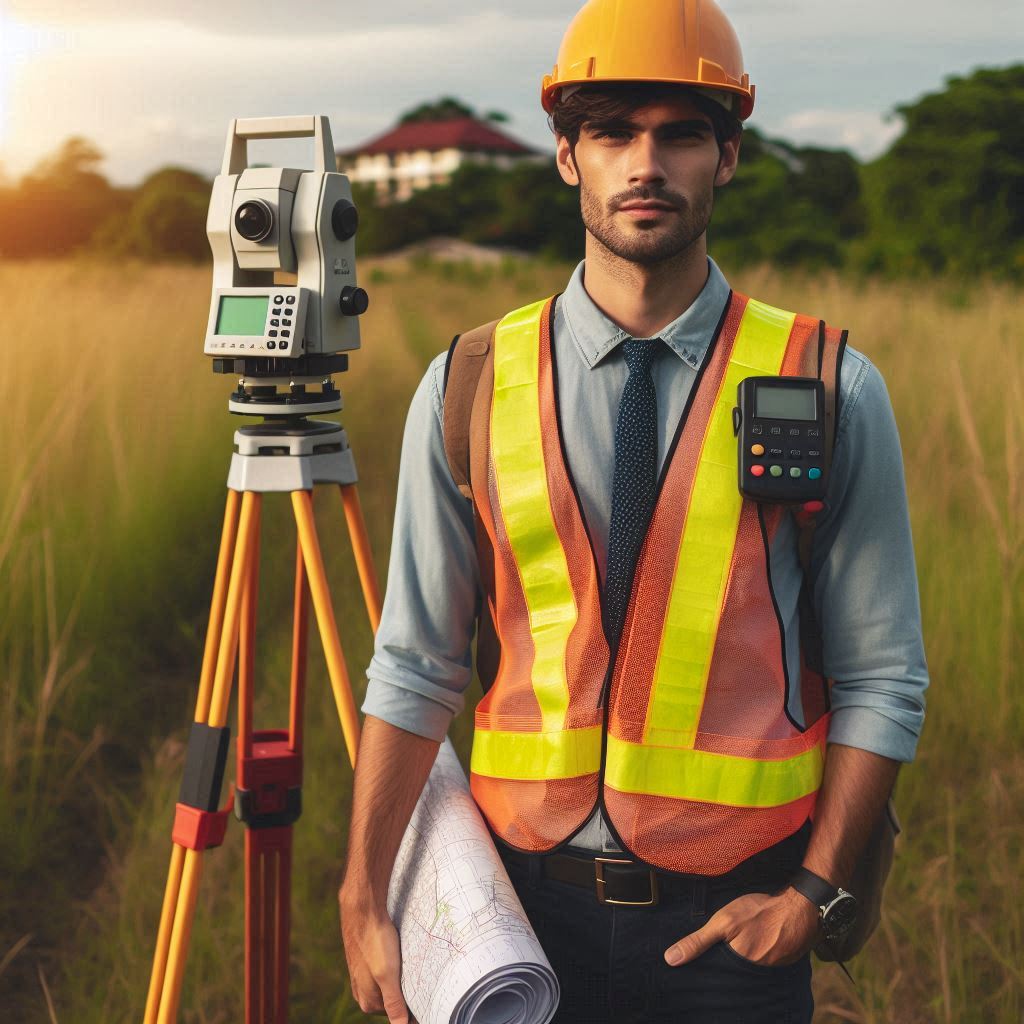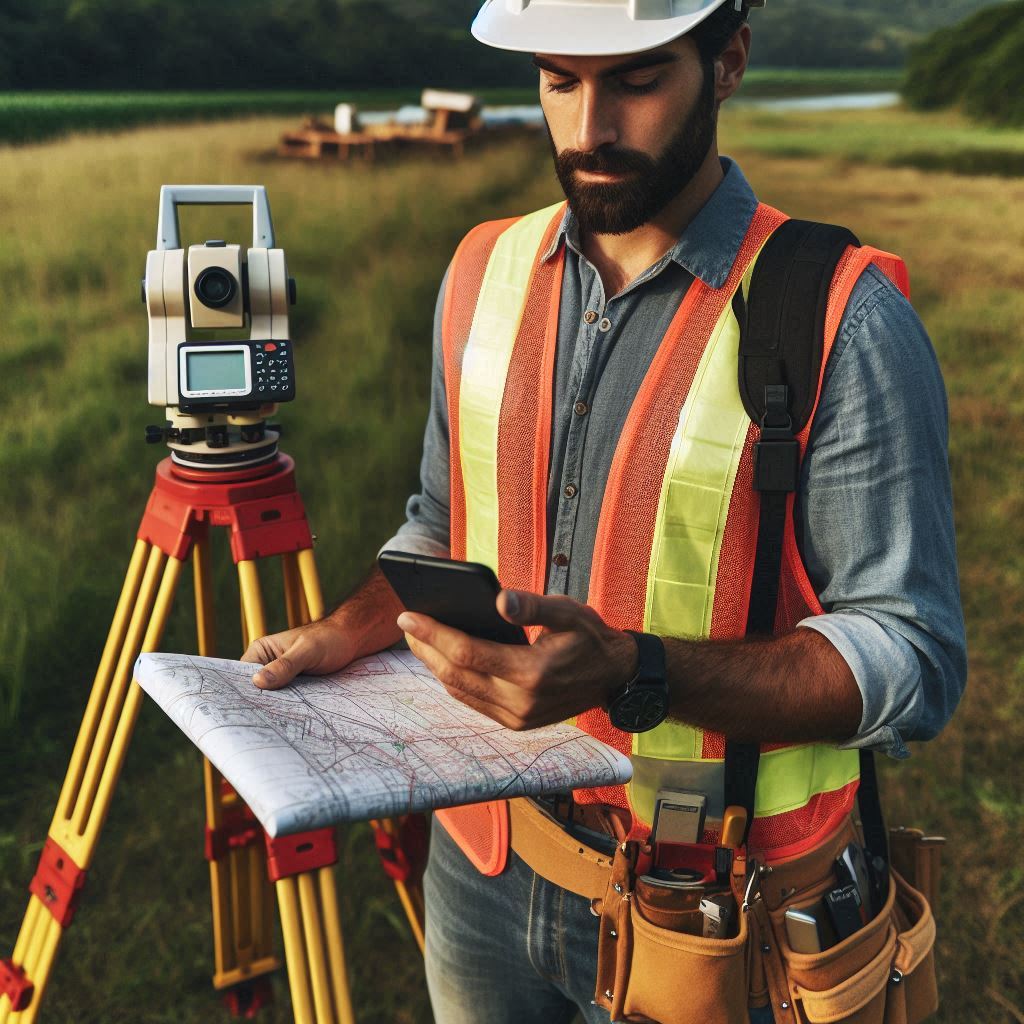Introduction
The Topic of Becoming a Surveying and Mapping Technician
Becoming a surveying and mapping technician can be an exciting career choice with broad opportunities.
This role focuses on measuring and mapping land to support various applications in different fields.
The Importance of Surveying and Mapping Technicians in Various Industries
Surveying and mapping technicians play a crucial role across industries such as construction, real estate, and environmental management.
They provide essential data that supports accurate planning, development, and conservation efforts.
In summary, pursuing a career as a surveying and mapping technician involves several key steps.
Begin with obtaining the right education, which provides the necessary skills and knowledge.
Gain practical experience through internships or entry-level positions to enhance your understanding of the field.
Certifications from professional organizations can further validate your expertise and improve job prospects.
This profession offers a dynamic and rewarding career path for those with a passion for precise measurements and geographic data.
The growing demand for skilled technicians across various industries highlights the importance of this role.
Stay focused on your goals, explore educational opportunities, and embrace the path to a successful career in surveying and mapping.
Research the Role
The Responsibilities and Duties of a Surveying and Mapping Technician
Surveying and mapping technicians assist surveyors and engineers by collecting and managing geographical data.
They use tools like total stations, GPS units, and laser scanners to measure distances, angles, and elevations.
Their data helps create accurate maps and plans for various projects.
Technicians verify data accuracy and comply with technical standards.
They also prepare detailed reports based on their findings.
Their work supports construction, engineering, and environmental management projects.
Information on the Skills and Qualifications Needed for This Role
To succeed as a surveying and mapping technician, strong mathematical and geometric skills are essential for accurate measurements and calculations.
Technicians must be proficient with surveying tools and software applications.
Good communication skills are necessary for effective teamwork and client interactions.
An educational background typically includes a diploma or associate degree in surveying, geomatics, or a related field.
Some positions may require a bachelor’s degree.
Certification from professional bodies, like the American Congress on Surveying and Mapping, can enhance career opportunities.
Practical experience through internships or on-the-job training is also valuable for developing the required technical skills.
Read: Graduate Studies in Biomedical Engineering
Education and Training Requirements
The Education Requirements for Becoming a Surveying and Mapping Technician
To become a surveying and mapping technician, a solid educational foundation is essential.
Most positions require at least a diploma or associate degree in surveying, geomatics, or a closely related field.
These programs provide fundamental knowledge in land surveying, mapping techniques, and geographic information systems (GIS).
Some technicians may pursue a bachelor’s degree for more advanced roles or specialized fields.
Coursework in these programs typically covers subjects like mathematics, physics, geography, and computer science.
Hands-on training is often included, allowing students to operate surveying equipment and use relevant software.
This education prepares technicians to handle the technical and analytical aspects of the job effectively.
Specific Certifications or Training Programs That May Be Beneficial
Certification can enhance job prospects and professional credibility.
In the United States, certification from the American Congress on Surveying and Mapping (ACSM) or the National Society of Professional Surveyors (NSPS) is valuable.
These certifications often require passing an exam and meeting specific educational and professional experience criteria.
Additionally, many technicians benefit from specialized training programs that focus on the latest surveying technologies and software.
These programs may cover advanced topics such as 3D laser scanning, drone surveying, and GIS applications.
Continuing education and professional development courses can help technicians stay current with industry advancements and maintain their competitive edge.
Read: Networking Tips for Biomedical Engineers
Gain Experience
The Importance of Gaining Practical Experience in the Field
Gaining practical experience is crucial for aspiring surveying and mapping technicians.
Hands-on experience allows you to apply theoretical knowledge to real-world situations.
It helps you develop technical skills, become proficient with surveying tools, and understand field procedures.
Experience in the field also enhances your problem-solving abilities and prepares you for the challenges of the job.
Employers value candidates who have practical experience, as it demonstrates your capability to handle the demands of the role effectively.
Ways to Gain Experience, Such as Internships or Entry-Level Positions
One effective way to gain experience is through internships.
Many educational programs offer internship opportunities where you can work alongside experienced professionals.
Internships provide valuable exposure to the field, help you build industry connections, and often lead to job offers.
Entry-level positions are another excellent way to gain practical experience.
Starting in roles such as surveying field assistant or junior technician allows you to learn on the job and gradually take on more responsibilities.
These positions often provide hands-on training with equipment and software used in the field.
Participating in relevant projects or volunteer work can also be beneficial.
Engaging in community projects or collaborating with local organizations can provide additional experience and showcase your skills.
Networking with professionals in the industry through seminars, workshops, and conferences can also open doors to job opportunities and mentorship.
In summary, gaining practical experience is vital for developing the skills needed to excel as a surveying and mapping technician.
Internships, entry-level positions, and volunteer work offer valuable opportunities to build your expertise and advance your career.
Read: Biomedical Engineer: Working in Healthcare Tech

Develop Technical Skills
Important Technical Skills Needed for This Role
Surveying and mapping technicians must possess a range of technical skills to perform their duties effectively:
- Knowledge of Surveying Equipment: Proficiency with tools such as total stations, GPS units, and laser scanners is essential.
- Mapping Software: Familiarity with GIS software and mapping applications like AutoCAD, ArcGIS, and MicroStation is crucial.
- Data Analysis: Ability to process and analyze data using statistical and spatial analysis techniques.
- Technical Drawing: Skills in creating and interpreting detailed technical drawings and maps.
- Field Measurement Techniques: Competence in measuring distances, angles, and elevations accurately in various field conditions.
- Computer Proficiency: Comfort with general computer applications and data management tools.
Resources for Improving Technical Skills
Several resources can help you enhance these technical skills:
- Online Courses: Platforms like Coursera, Udemy, and LinkedIn Learning offer courses on surveying techniques, GIS software, and mapping applications. Look for specific courses in GIS, AutoCAD, or advanced surveying methods.
- Workshops and Seminars: Attend industry workshops and seminars to gain hands-on experience with the latest technologies and software. Professional organizations, such as the American Society of Civil Engineers (ASCE) and the International Federation of Surveyors (FIG), often host these events.
- Certification Programs: Pursue certifications from professional bodies like the American Congress on Surveying and Mapping (ACSM) or the National Society of Professional Surveyors (NSPS). These programs often include training that enhances technical skills.
- University and College Programs: Some universities offer advanced courses and workshops focusing on specialized surveying and mapping skills. Check local institutions for relevant programs.
- Professional Journals and Publications: Read industry journals and publications to stay updated on new technologies and methodologies. Journals such as Surveying and Land Information Science provide valuable insights and updates.
By leveraging these resources, you can continuously improve your technical skills and stay competitive in the field of surveying and mapping.
Networking and Professional Development
The Value of Networking Within the Surveying and Mapping Industry
Networking plays a crucial role in advancing your career as a surveying and mapping technician.
Building a strong network within the industry can lead to valuable opportunities, such as job openings, collaborations, and mentorship.
Engaging with professionals helps you gain insights into industry trends, best practices, and emerging technologies.
Networking also enhances your professional reputation and opens doors for career advancement and professional growth.
Tips for Building Professional Connections and Staying Updated on Industry Trends
- Attend Industry Events: Participate in conferences, seminars, and workshops related to surveying and mapping. These events provide opportunities to meet industry experts, learn about the latest developments, and exchange ideas with peers.
- Join Professional Organizations: Become a member of professional associations like the American Congress on Surveying and Mapping (ACSM) or the National Society of Professional Surveyors (NSPS). These organizations offer networking opportunities, professional development resources, and industry updates.
- Leverage Social Media: Use platforms like LinkedIn to connect with industry professionals, join relevant groups, and participate in discussions. Follow companies and thought leaders to stay informed about industry trends and job opportunities.
- Engage in Online Forums: Participate in online forums and discussion boards related to surveying and mapping. These platforms allow you to ask questions, share knowledge, and connect with other professionals.
- Seek Mentorship: Find a mentor who can provide guidance, share their experience, and help you navigate your career path. A mentor can offer valuable advice, introduce you to other professionals, and help you build your network.
- Subscribe to Industry Publications: Stay updated on industry trends by subscribing to relevant journals, magazines, and newsletters. Publications like Surveying and Land Information Science offer insights into new technologies and industry developments.
- Engage in Continuous Learning: Enroll in professional development courses and workshops to keep your skills current. Continuing education not only enhances your expertise but also provides opportunities to meet other professionals in your field.
By actively networking and pursuing professional development, you can enhance your career prospects, stay informed about industry advancements, and build valuable connections within the surveying and mapping community.
Read: The Role of Aerospace Engineers in Satellite Development
Job Search Strategies
How to Search for Job Opportunities in the Surveying and Mapping Field
- Use Job Boards and Websites: Explore job boards like Indeed, Glassdoor, and LinkedIn for openings in surveying and mapping. Specialized sites such as the American Congress on Surveying and Mapping (ACSM) job board can also be useful.
- Check Company Websites: Visit the career pages of companies and organizations specializing in surveying, engineering, and construction. Companies often list job openings directly on their websites.
- Leverage Professional Networks: Utilize your professional connections and network to learn about job openings. Inform friends, colleagues, and mentors that you are seeking opportunities.
- Attend Job Fairs and Networking Events: Participate in industry job fairs and networking events to meet potential employers and learn about job openings.
- Contact Recruitment Agencies: Reach out to recruitment agencies that specialize in technical and engineering roles. They can help you find suitable positions and provide guidance on the job search process.
- Join Industry Groups and Forums: Engage in online forums and professional groups related to surveying and mapping. Members often share job leads and opportunities within these communities.
Tips for Creating a Strong Resume and Preparing for Job Interviews
- Tailor Your Resume: Customize your resume to highlight relevant experience, skills, and accomplishments in surveying and mapping. Use keywords from job descriptions to ensure your resume passes through applicant tracking systems.
- Highlight Technical Skills: Emphasize your proficiency with surveying equipment, mapping software, and data analysis. Include specific examples of projects or tasks where you utilized these skills.
- Showcase Practical Experience: Detail any internships, entry-level positions, or projects that demonstrate your hands-on experience in the field. Quantify your achievements where possible to show your impact.
- Prepare a Professional Portfolio: Compile a portfolio showcasing your work, including maps, reports, and project examples. A well-organized portfolio can provide tangible evidence of your skills and expertise.
- Practice Interview Questions: Prepare for common interview questions related to surveying and mapping. Focus on your technical knowledge, problem-solving abilities, and teamwork experiences.
- Research the Employer: Before the interview, research the company’s projects, values, and recent developments. Tailor your responses to show how your skills and experiences align with their needs.
- Demonstrate Soft Skills: In addition to technical skills, emphasize your communication, teamwork, and problem-solving abilities. These soft skills are important for collaborating with teams and managing projects effectively.
- Follow Up: After the interview, send a thank-you email to express your appreciation for the opportunity. This gesture reinforces your interest in the position and keeps you top of mind.
By employing these job search strategies and preparing thoroughly for interviews, you can enhance your chances of landing a position in the surveying and mapping field.
Conclusion
The Key Points Discussed in the Blog Post
Becoming a surveying and mapping technician requires several essential steps.
First, obtain a relevant education through specialized programs, which offer foundational knowledge and practical skills.
Next, gain hands-on experience by seeking internships or entry-level positions, which will help you understand the industry better.
Acquiring certifications from professional organizations is also crucial, as they validate your expertise and improve your job prospects.
These steps will prepare you for a successful career in this field.
Transform Your Career Today
Unlock a personalized career strategy that drives real results. Get tailored advice and a roadmap designed just for you.
Start NowEncouragement to Pursue Their Goal of Becoming a Surveying and Mapping Technician
If you have a passion for precise measurements and geographic data, pursuing a career as a surveying and mapping technician can be highly rewarding.
The field is expanding, with increasing demand for skilled professionals.
Explore educational programs and training opportunities to build your skills and knowledge.
Stay focused on your career goals and remain dedicated to your development.
With commitment and perseverance, you can achieve a successful and fulfilling career in surveying and mapping.
Your dedication will open doors to diverse opportunities and a satisfying profession.




